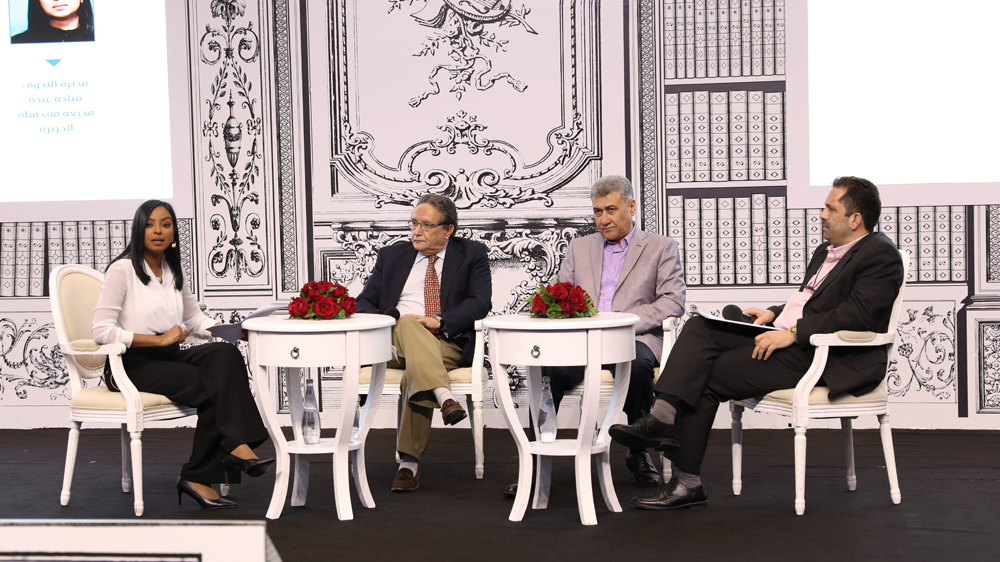
A dialogue seminar organised by Al Jazeera Centre for Studies on Saturday, 11 January 2020, in Doha under the title “The Role of the Media in Shaping Representations and Manufacturing Reality,” concluded that the hold of authorities in totalitarian states on media is no longer as strong or easy as it was in the past because of new media outlets, especially social media platforms, that have rendered consumers both senders and receivers at the same time.
The seminar also confirmed the role of the democratic environment in the integrity of the media and the ability of democratic regimes’ mechanisms to dissipate rumours and quickly expose facts. Furthermore, it indicated that authoritarian regimes are now resorting to the creation of hoaxes and methods to mitigate the focus on important issues that concern public opinion and to create a new reality that serves its interests such as bribing writers, organising targeting seminars and conferences, and spending immense amounts of money on advertisement agencies and commissioning them to demonise political opponents and glorify the images of the aforementioned regimes.
The seminar was held as part of the Doha International Book Fair’s activities, which commenced in Doha on Thursday, 9 January 2020, with the participation of: Nawaf Altamimi, professor of journalism at Doha Institute for Graduate Studies; Mohamed Kirat, professor of public relations and strategic communication at Qatar University; and Liqaa Maki, senior researcher at Al Jazeera Centre for Studies and former professor of media at the University of Baghdad with Al Jazeera presenter Mayada Abdo as moderator.
Part of the political and economic regime
At the beginning of the seminar, Mohamed Kirat indicated that the phenomenon of fabricating reality and distorting facts is not a new one, and that media institutes are subsidiary institutes of political and economic regimes, each of which with its own ideology and cultural, social, political and religious environment. When there is a crisis or conflict, he explained, media outlets portray it from their own perspective and as per their own visions and agendas – which explains the discrepancy in the coverage of the war in Syria, for example, by state media and that of other media outlets.
On authoritarian regimes’ new methods of distorting and fabricating facts in order to influence and misguide local and global public opinion, Kirat mentioned: bribing writers and buying off consciences, spending millions of dollars on public relations agencies to vilify states and political opponents, fabricating seminars and conferences, and sometimes – according to him – organising fabricated, paid and targeted demonstrations.
Kirat also reminded the audience of the lie of the US administration under George W. Bush regarding Iraq’s possession of weapons of mass destruction in Iraq and using that pretext to invade the country. After major US media outlets had reiterated that lie, its fabrication was exposed.
Individual and societal awareness
For his part, Nawaf Altamimi chose in his presentation to address the role of new media in the increase of individual and societal awareness. In this regards, he suggested that until recently, authoritarian regimes had total or almost total control over the media and thus manipulated public opinion according to their interests, rendering society unable to know alternative perspectives in light of the monopoly on visual, print and audio media. Now, however, he says, with new media – especially social media, Youtube and so on – authorities can no longer fully control or steer public opinion. As a result of this challenge, we see them coming up with new ways of controlling public opinion, such as: imposing strict laws against “cybercrimes;” “diluting the public domain” by increasing satellite channels to over 300 in the Arab world; overwhelming the public domain with secondary and superficial news, issues and topics; using “influencers” and celebrities to steer public opinion towards irrelevant spheres; creating realities that oppose the reality on the ground; and finally, the carrot and the stick approach.
Altamimi concluded his presentation by discussing what he called, “the undercurrent of silence,” that is, the state of social media users when they have opinions that conflict with the prevailing trend so they opt to remain silence in order to maintain their safety. In actuality, Altamimi argues, the term, “prevailing trend” is a contrived one that does not represent real public opinion; in fact, it was created by electronic armies, or “electronic flies,” that are associated with certain regimes and whose objective is to create a state in which a fabricated public opinion can reign.
A change in the process of communication
On the dangers of manufacturing facts to public opinion, Liqaa Maki explained that “it was somewhat easier in the past when media outlets were monopolised and audiences were mere recipients. Now, however, with new media, the process of communication is no longer unilateral (with the sender sending his or her message to the recipient) but has become a “communication circuit” in which the sender is a recipient and the recipient is a sender at the same time in an interactive process.
In his presentation, Maki also touched on the effect of modern technology on the multitude of media outlets and the resulting difficulty the recipient faces in learning the orientation of this or that outlet and determining who is behind it, who funds it, and what its agenda is. Accordingly, he says, rumours and fake news with anonymous sources spread by not only regimes, groups and political parties like in the past but also individuals swayed by certain religious and political ideologies, taking advantage of the state of mystery, the lack of information and the importance of the topic presented to the recipient. Furthermore, the ability to do this decreases significantly under democratic regimes that apply the principle of transparency and consider public opinion a fourth authority. Under these circumstances, Maki concluded, even if a rumour were spread, it would quickly dissipate due to the initiative of free media outlets to expose the truth.